
COVER STORY: CANARIES
IN 1945 the Lizard canary was in a parlous state. The Second World War had taken its toll of breeders and their birds, and the number of surviving Lizards had plummeted to a dangerously low level. So concerned were the founders of the Lizard Canary Association that the minutes of the inaugural meeting held on May 13, 1945 contained the following plea:
“The Council is determined to keep the Lizard true to type. With this in view it is hoped that all members of the Association when disposing of stock birds, will give priority to fellow members. All are asked to give this resolution their fullest support.”
Thanks to the LCA’s guardianship, the Lizard recovered. Numbers have varied over the years, but you can still see more than 150 exhibits at specialist shows in the UK, and several hundred at some of the larger European events. Amidst all that abundance, surely any talk of extinction is nonsense?
The answer, as far as the classic Lizard canary is concerned, might surprise you.
I use the term “classic” to denote the true-bred Lizard, a breed that has survived intact for three centuries; no other canary has such an ancient heritage. By definition, a true-bred Lizard is a bird that is free from alien genes, but they are now in the minority since colour variants of the Lizard have developed a following in the UK and abroad.
The colour variants have been produced by cross-breeding the Lizard with colour canaries, the most common being white (better known as “blue” in the Lizard) and brown (cinnamon or Ocelado), but there are several others.
Diese Geschichte stammt aus der September 18, 2019-Ausgabe von Cage & Aviary Birds.
Starten Sie Ihre 7-tägige kostenlose Testversion von Magzter GOLD, um auf Tausende kuratierte Premium-Storys sowie über 8.000 Zeitschriften und Zeitungen zuzugreifen.
Bereits Abonnent ? Anmelden
Diese Geschichte stammt aus der September 18, 2019-Ausgabe von Cage & Aviary Birds.
Starten Sie Ihre 7-tägige kostenlose Testversion von Magzter GOLD, um auf Tausende kuratierte Premium-Storys sowie über 8.000 Zeitschriften und Zeitungen zuzugreifen.
Bereits Abonnent? Anmelden
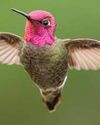
The World's Best-Known Hummingbird?
Intensively studied, the gem-like Anna’s hummingbird is a welcome visitor to the gardens of America’s most populous state: California. Bill Naylor investigates its life history
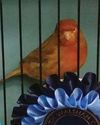
The charm of the English Cinnamon
Despite its long and complicated history, the true Cinnamon canary is still with us – in the hands of a tiny group of breeders. DONALD SKINNER-REID reckons it deserves wider appreciation
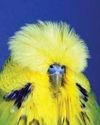
Spangles: a personal overview
FRED WRIGHT relates a budgie story of over-exploitation, consequent problems and abundant potential for the future

New converts to old breeds
Old and rare canaries have a reputation for adding fresh interest and challenge to the hobby. PETE HOOK and NICK JOY agree, and explain the birds’ charm to Dave Brown

Themed aviaries are a hit with the public at annual Stafford show
DECORATIVE AVIARY DISPLAYS from a CBS and an online bird keeping advice group were voted in the top three by visitors for the inaugural Stafford Aviary Competition.
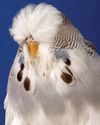
Pieds with potential
More than just a lesser variety, the dominant pied will introduce challenge and change into most studs, reckons CLIVE WAKEMAN. Here he discusses pairings to try and others to avoid

Club News
Welcome to the club and show pages – the bit that’s all about you Results: convention, specialist & rare and Breeder of the Year
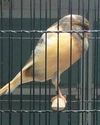
Canaries Month by Month:
With Christmas around the corner, BRIAN KEENAN is well into his winter programme, and reckons he might deserve a nice outcross
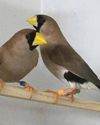
Smart Choice, Docile Nature
Dave Brown welcomes the masked grassfinch to his birdroom and shares advice on this lovely Australian species
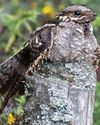
The truth about the ‘flying toad'
Odd local names and weird superstitions can’t hide the beauty and elegance of the nightjar, a species that has made a fascinating subject in a few zoo collections, reveals BILL NAYLOR